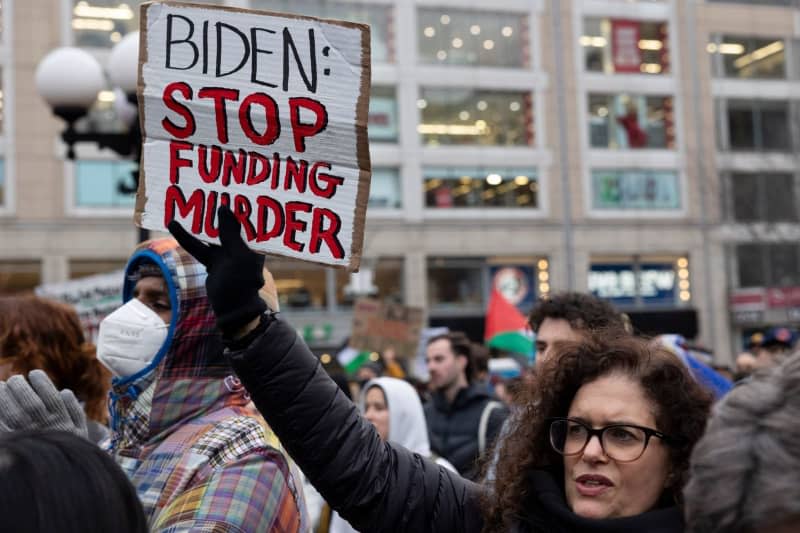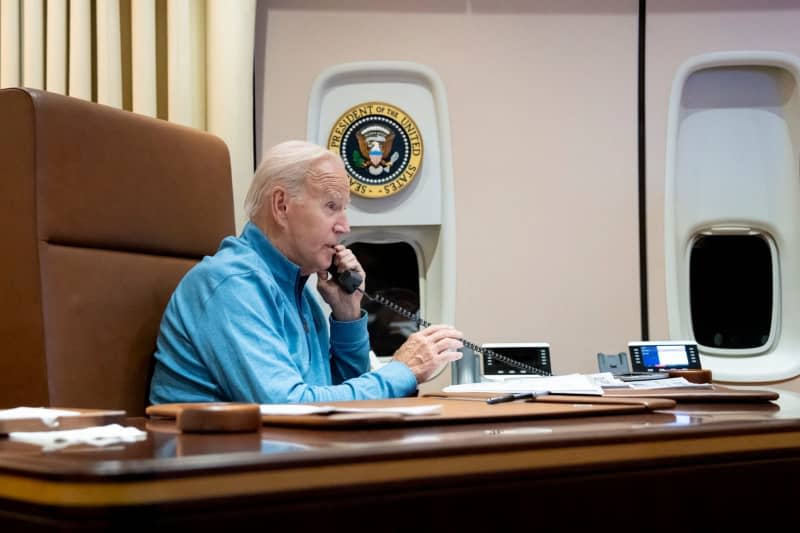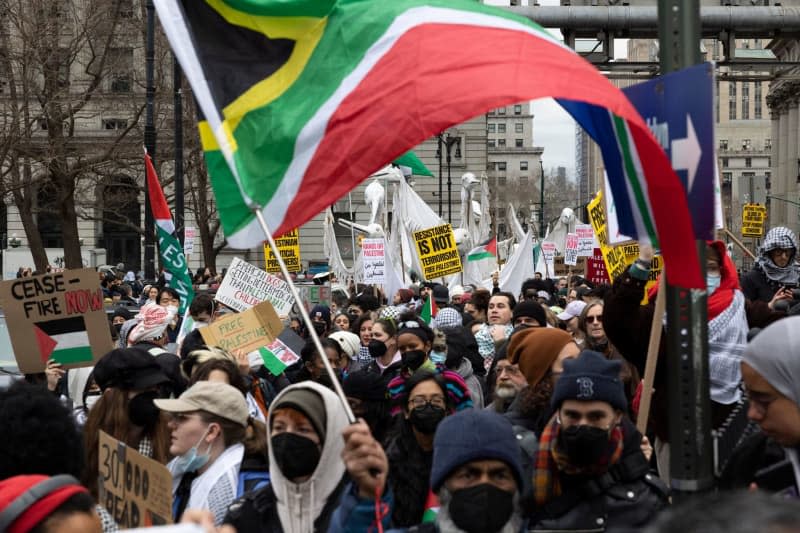Some young voters can't bring themselves to vote for Biden over Gaza

- Oops!Something went wrong.Please try again later.
- Oops!Something went wrong.Please try again later.
“Vote blue no matter who” was Madelyn Shick’s mantra before she could even vote after former US president Donald Trump's rise in 2016. She argued with people supporting third party candidates, but now she’s on the other side of that dispute.
Shick, 22, said she can’t vote for any candidate who hasn’t already called for a permanent ceasefire in the Israel-Hamas war, including President Joe Biden.
“It’s hard to say that Trump will be much worse, and that’s coming from someone who wore Biden shirts, wore Biden pins, and really, really, really, thought we had to keep Trump out,” said Shick, a recent graduate from Philadelphia's Drexel University now working as a legal assistant.
Young voters across the region who are frustrated with Biden have a conundrum: to vote or not to vote in the upcoming presidential elections in November. And if so, for whom?
Biden won voters under age 30 by a wide margin in 2020, but his popularity with that group has plummeted and polls suggest the conflict in Gaza has played a role. An erosion of support among young voters, who lean Democratic, could prove significant as Biden looks to hold onto the fragile coalition that elected him in 2020 with his reelection contest just nine months away.
The Inquirer interviewed two dozen young voters, including ceasefire activists, College Democrats, and other Philadelphia area students. All but one expressed frustration with Biden - with most pointing to Gaza, where the death toll continues to rise - as a key reason. Half said they will still vote for Biden in a match-up with Trump, but the rest said they have yet to decide or plan to withhold their vote for Biden.
While young voters have also expressed overall frustrations with Biden’s age and progress on certain domestic policies, the Israel-Hamas war has become a particularly potent issue. At nearly every campaign stop, including in Pennsylvania, a critical battleground, ceasefire activists have protested the president. The moments illustrate a fractured Democratic Party with generational and ideological divides and have drawn attention to dissatisfaction with Biden and away from his campaign messaging.
A December New York Times/Siena College poll found that 72% of voters ages 18 to 29 disapproved of Biden’s handling of the conflict, compared to 20% who approved. And more broadly, 67% of voters in this age group disapproved of Biden’s overall job performance.
Young voters typically vote at a lower rate than older voters, who appear more sympathetic to Biden’s stance on Israel in the wake of the October 7 attack by Hamas, which killed 1,200 people and saw about 250 people taken hostage. The New York Times poll showed that 52% of voters over 65 approved of the president’s handling of the issue.
The age gap on the issue reflects broader fissures in the Democratic base, which Biden could struggle to repair before Election Day.
“That’s what I’m terrified about,” said state Rep. Rick Krajewski, a Democrat who represents parts of West Philadelphia. “The same coalition that had to come together in 2020 has to come together again in 2024 and right now I’m seeing a glaring gap in that coalition because of a lot of these voters who feel extremely frustrated and disillusioned.”
Noor Bowman, 22, who is Muslim and has participated in ceasefire protests, said her peers previously felt that voting blue was the safest option - even when they weren’t enthusiastic about the candidate. But they’re shifting away from that perspective due to both parties’ support for Israel.
“I don’t feel like I’m better because of this president, or worse because of that president,” said Bowman, a Drexel senior who campaigned and voted for Biden in 2020 but says she won’t vote for him again. “But what I can see is that there’s a group of people that are worse off because of our national stance on policy. So if a president is continuing to perpetuate this, then I can’t vote for them.”
A form of protest
In December, more than 300 ceasefire protesters stood outside of a Biden fundraiser on Penn’s Landing, chanting “In November, we’ll remember.”
He also faced smaller demonstrations during his three visits to Pennsylvania in January to Montgomery County, the Allentown area and a Philadelphia food bank.
“Joe Biden is approaching the situation in the Middle East not through the lens of politics but as the commander in chief of this country prioritizing American security and global security,” said Biden deputy campaign manager Quentin Fulks when asked by reporters about the protests.
The campaign has highlighted Trump’s anti-Muslim rhetoric and policies, and argued that Biden has handled interruptions with respect for protesters’ First Amendment rights, which Fulks called “a stark contrast with the Republicans, with Donald Trump who’s out here talking about banning Muslims ... who wants to further divide Americans.”
Those who won’t vote for Biden over the issue see it as another form of protest - a method of holding officials who have ignored their demands accountable. Some see a short-term Trump presidency as the cost of long-term change, whether through Democrats taking them more seriously or third parties gaining traction.
While there are nine months until Election Day, some said their view of Biden wouldn’t change even if he called for a ceasefire, saying the harm has already been done.
“I don’t think either of them deserve my support,” said Nada Abuasi, 22, a Palestinian Drexel graduate student and Philly Palestine Coalition organizer who voted for Biden in 2020. “The idea is not to not vote for Biden and vote for Trump, it’s to withhold your vote altogether. It’s to not even participate in the electoral system.”
Abuasi was one of 10 young voters who described the conflict as a “genocide” when discussing their frustrations with Biden, a categorization that more than one third of Americans agree with, according to a January Economist/YouGov poll. Israeli and US officials have vehemently opposed using the term to describe Israel’s war against Hamas, as alleged in a United Nations court case brought by South Africa.
Gage Bernstein, 22, a junior and member of the Temple Democrats, stands out among the student political group for being pro-Israel. He is concerned about his peers abandoning other issues they care about and viewing Biden “as some type of right-winger for this, and he really isn’t,” Bernstein said.
“I’m worried they’re going to see Biden for who he isn’t, and it could siphon votes from him,” Bernstein said. “And obviously, none of us want Trump reelected.”
A reluctant vote
Biden is still leading with voters under 30 - 55% said they’d back him over Trump in the Economist/YouGov poll, but that’s a drop from the percentage who backed Biden in 2020, according to exit polls.
Kate Lyden, 21, a Lehigh University senior and the president of Pennsylvania College Democrats, said that young people want elected officials to listen, and while they currently feel betrayed, they have a better chance of being heard by Biden than Trump.
“Is Biden the most ideal path forward? No.” Lyden said. “But in terms of what the end goal is, if young people collectively want a ceasefire - or at least America or the administration to take the stance of calling for a ceasefire and doing so - I think continuing to support Biden is going to be the way forward.”
Most of the young people who told The Inquirer they’ll back Biden are doing so unenthusiastically, abiding by the Democratic Party’s gospel that Trump is a serious threat to other issues important to young voters like reproductive rights, LGBTQ rights, climate change, gun violence, and democracy. But still, some feel conflicted and don’t see the Democratic Party fulfilling its promises.
“I think the majority of people that I know are voting for Biden, but I don’t think anybody’s happy about it,” said Amanda Le, 19, a Temple University sophomore.
And while an unenthused vote counts the same as an enthused one - there’s also the question of how an erosion of support among young people could impact organizing.
Madeline Kessler, 21, a Bryn Mawr College senior, said that she will only vote for Biden if he helps bring an end to the war. Even then, she won’t actively campaign for him.
“I will never buy a Biden 2024 T-shirt,” said Kessler, who is Jewish and was one of the organizers of a ceasefire protest last month in which students marched from Haverford College to Bryn Mawr. “I will not knock on a single door for him. I will not make a single phone call, and I’m sure I’m not the only young person who feels that way.”
Sarah Niebler, political science professor at Dickinson College, noted it’s unclear what the war might look like in November. But Biden’s primary argument that Trump is a more dangerous choice may not resonate, she said.
“Especially for young voters whose memory is shorter, if they’re 18, 19 ... they weren’t maybe paying as close attention,” Niebler said. “They don’t remember or may not feel that urgency of voting against someone.”
Elez Beresin-Scher, 21, a Bryn Mawr junior who is Jewish, said she doesn’t know whether she will vote for Biden because his support for Israel poses a moral dilemma.
“I think we have leverage,” said Beresin-Scher, one of the protest organizers. “I think we have power in numbers. I think that real change only ever happens because people pressure those in power and force those in power to make changes.”



